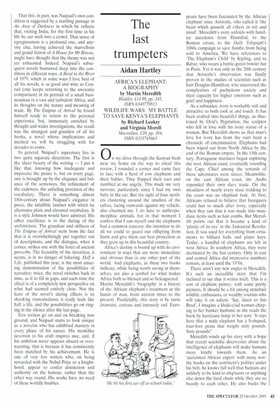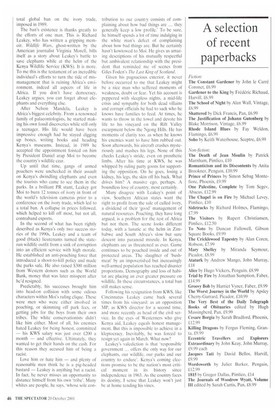The last trumpeters
Aidan Hartley
AFRICA'S ELEPHANT: A BIOGRAPHY by Martin Meredith
Hodder, £14.99, pp. 245, ISBN 0340770813
WILDLIFE WARS: MY BATTLE TO SAVE KENYA'S ELEPHANTS by Richard Leakey and Virginia Morel!
Macmillan. £20, pp. 304, ISBN 0333745663
0 n my drive through the Kenyan bush near my home on the way to email this review, I rounded a corner and came face to face with a herd of cow elephants and their babies. They flapped their ears and rumbled at me angrily. This made me very nervous, particularly since I had my own baby in the car. But the sight of four mothers clustering around the smallest of the calves, facing outwards against my vehicle, also charmed me. I do hate to anthropomorphise animals, but in that moment I confess that I saw myself and the elephants had a common concern: the intention to do all we could to guard our offspring from harm and give them our best protection as they grew up in this beautiful country.
Africa's destiny is bound up with its environment in ways that are more immediate and obvious than in any other part of the world. And elephants, as these two books indicate, while being worth saving in themselves, are also a symbol for what makes Africa both so blessed and so beleaguered. Martin Meredith's 'biography' is a history of the African elephant's treatment at the hands of man, from ancient times to the present. Predictably, this story is by turns dramatic, curious and intensely sad. Euro
peans have been fascinated by the African elephant since Aristotle, who called it 'the beast which passeth all others in wit and mind'. Meredith's story unfolds with familiar anecdotes from Hannibal, to the Roman circus, to the Daily Telegraph's 1880s campaign to save Jumbo from being sold to America. We have references to 'The Elephant's Child' by Kipling, and to Babar, who wears a bottle-green howler hat in Paris. Yet it was only in the 20th century that Aristotle's observation was finally proven in the studies of scientists such as Fain Douglas-Hamilton, who uncovered the complexities of pachyderm society and their capacity for higher emotions such as grief and happiness.
As a substance, ivory is workably soft and attractive to both look at and touch. It has been crafted into beautiful things, as illustrated by Ovid's Pygmalion, the sculptor who fell in love with his ivory statue of a woman. But Meredith shows us that man's love for ivory has from the start been a chronicle of extermination. Elephants had been wiped out from North Africa by the end of the Roman empire. In the 15th century, Portuguese mariners began exploring the west African coast, eventually rounding the Cape. Chief among the rewards of these adventures were slaves. Meanwhile, on the east African coast, the Arabs expanded their own slave trade. On the shoulders of nearly every slave trekking to the coast was an elephant tusk. At first, Africans refused to believe that foreigners could lust so much after ivory, especially when they saw that it was made into mundane items such as hair combs. But Meredith points out that it became a kind of 'plastic of its era' in the Industrial Revolution. It was used for everything from ornaments to billiard balls and piano keys. Today, a handful of elephants are left in west Africa, In southern Africa, they were decimated by the last century. Only in east and central Africa did impressive numbers remain, at least until the 1970s.
There aren't any new angles in Meredith. It's such an incredible story that I'm inclined to say that it writes itself. This is a sort of elephant primer, with some pretty pictures. It should be a hit among armchair wildlife enthusiasts, or wealthy tourists who will take it on safaris. 'Say, listen to this Brad', I imagine a khaki-clad woman chirping to her banker husband as she reads the book by hurricane lamp in her tent. 'It says here that a male elephant has a S-shaped, four-foot penis that weighs sixty pounds. Sixty pounds!'
Meredith winds up his story with a hope that recent scientific discoveries about the intelligence of elephants will make humans more kindly towards them. As an 'acclaimed African expert' with many worthy books on the continent's politics under his belt, he knows full well that humans are unlikely to be kind to elephants or anything else down the food chain while they are so beastly to each other. He also backs the total global ban on the ivory trade, imposed in 1989.
The ban's existence is thanks greatly to the efforts of one man. This is Richard Leakey, who has written a gripping memoir. Wildlife Wars, ghost-written by the American journalist Virginia More11, bills itself as a story about Leakey's battle to save elephants while at the helm of the Kenya Wildlife Service (KWS). It is more. To me this is the testament of an incredible individual's efforts to turn the tide of mismanagement that is ruining Africa's environment, indeed all aspects of life in Africa, If you don't have democracy, Leakey argues, you can forget about elephants and everything else.
After Nelson Mandela, Leakey is Africa's biggest celebrity. From a renowned family of palaeontologists, he started making his own fossil discoveries while still only a teenager. His life would have been impressive enough had he stayed digging up bones, writing books and heading Kenya's museums. instead, in 1989 he accepted the appointment foisted on him by President Daniel arap Moi to become the country's wildlife czar.
Up until that time, gangs of armed poachers were unchecked in their assault on Kenya's dwindling elephants and even the tourists who came to see them in the parks. In a brilliant PR stunt, Leakey got Moi to burn 12 tonnes of ivory in front of the world's television cameras prior to a conference on the ivory trade, which led to a total ban. A collapse in prices followed, which helped to kill off most, but not all, contraband exports.
In the second of what has been rightly described as Kenya's only two success stories of the 1990s, Leakey and a team of good (black) lieutenants turned the staterun wildlife outfit from a sink of corruption into an efficient service with high morale. He established an anti-poaching force that introduced a shoot-to-kill policy and made the parks safe. He also raised $300 million from Western donors such as the World Bank, money that was later misspent after he'd resigned.
Predictably, his successes brought him into head-on collision with some odious characters within Moi's ruling clique. These were men who were either involved in poaching, or skimming off park fees, or getting jobs for the boys from their own tribes. The white conservationists didn't like him either. Most of all, his enemies hated Leakey for being honest, committed — his KWS salary was just over £200 a month — and effective. Ultimately, they wanted to get their hands on the cash. For this reason they accused him of being a racist.
Love him or hate him — and plenty of reasonable men think he is a pig-headed bastard — Leakey is anything but a racist. In fact, he never misses an opportunity to distance himself from his own 'tribe'. Many whites are people, he says, 'whose sole con
tribution to our country consists of complaining about how bad things are ... they generally keep a low profile.' To be sure, he himself spends a lot of time indulging in the white man's defect of complaining about how had things are. But he certainly hasn't kowtowed to Moi. He gives us amazing descriptions of his mutually respectful but ambivalent relationship with the president that reminded me of scenes from Giles Foden's The Last King of Scotland.
Given his pugnacious exterior, it never before occurred to me that Leakey might be a nice man who suffered moments of weakness, doubt or fear. Yet his account is peppered with sleepless nights, a mid-life crisis and sympathy for both dead villains and corrupt officials he had to sack who he knows have families to feed. At times, he wants to throw in the towel and devote his life to his vineyard on the Rift Valley escarpment below the Ngong Hills. He has moments of clarity too. as when he knows his enemies want to have him rubbed out. Soon afterwards, his aircraft crashes mysteriously and mashes his legs. None of this checks Leakey's stride, even on prosthetic limbs. After his time at KWS, he was whipped by ruling party goons for supporting the opposition. On he goes, losing a kidney, his legs, the skin off his back. What drives him? A massive ego, perhaps. A boundless love of country, most certainly.
Many disagree with Leakey's point of view. Southern African states want the right to profit from the sale of culled ivory, a dividend of their 'good' management of natural resources. Poaching, they have long argued, is a problem for the rest of Africa but not them. The scene looks different today, with a lunatic at the helm in Zimbabwe and South Africa's slow but sure descent into paranoid misrule. In Kenya, elephants are as threatened as ever. Game continues to be poached inside and out of protected areas. The slaughter of 'bushmeat' by an impoverished but increasingly well-armed population has reached disaster proportions. Demography and loss of habitat are placing an ever greater pressure on wildlife. In these circumstances, a total ban still makes sense.
Following his resignation from KWS, like Cincinnatus Leakey came back several times from his vineyard: as an opposition MP, as KWS director for a second time, and more recently as head of the civil service. In the eyes of Westerners who give Kenya aid, Leakey equals honest management. But this is impossible to achieve in a kleptocracy. Inevitably, he was forced to resign yet again in March. What now?
Leakey's valediction is that 'responsible government ... offers the only way for our elephants, our wildlife, our parks and our country to endure'. Kenya's coming elections promise to be the nation's most critical moment in its history since independence in 1963. As the country faces its destiny. I sense that Leakey won't just be at home tending his vines.



























































































 Previous page
Previous page